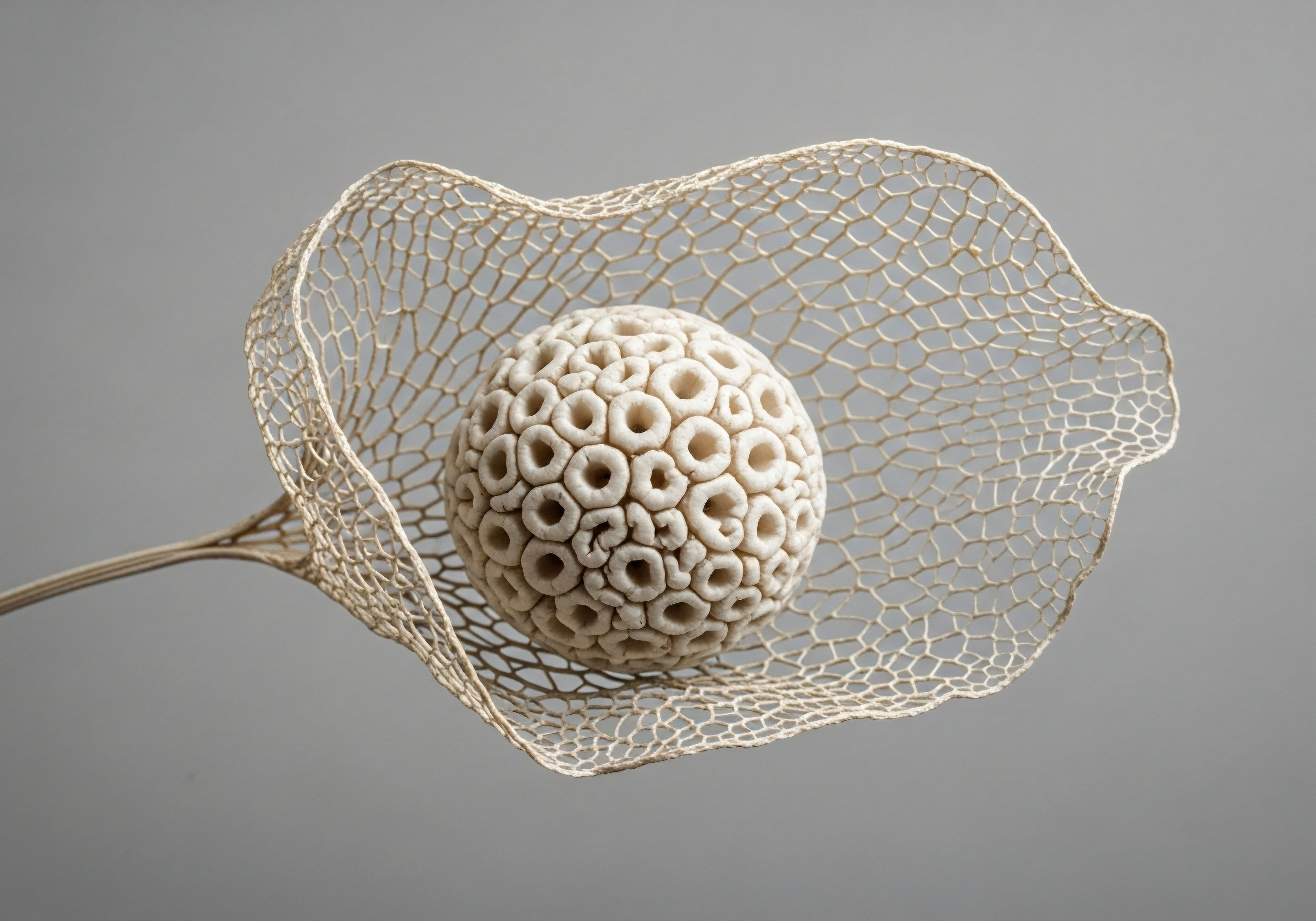

The Uncharted Territories of Nocturnal Cognition
The human brain, a marvel of biological engineering, operates on intricate cycles of activity and restoration. For too long, the profound impact of sleep on cognitive function has been relegated to a passive state of rest. However, a deeper scientific understanding reveals sleep as a dynamic, anabolic period where critical cognitive architecture is reinforced, memories are consolidated, and neural pathways are optimized.
This nightly process is not merely restorative; it is formative. The brain’s capacity for learning, problem-solving, and emotional regulation is fundamentally shaped by the quality and depth of our nocturnal cognitive forge. Neglecting this vital phase means forfeiting significant potential for mental acuity and resilience. The architecture of superior cognition is not built solely during waking hours; it is meticulously constructed and refined during sleep.
Hormonal signaling orchestrates this critical nightly work. Growth hormone (GH), primarily released in pulses during deep sleep (slow-wave sleep), is paramount for tissue repair, including the neural tissues of the brain. Its release is governed by the interplay of hormones like growth hormone-releasing hormone (GHRH) and somatostatin, which are themselves influenced by the circadian system.
This hormonal symphony during sleep is directly linked to enhanced memory consolidation and synaptic plasticity. Conversely, disruptions in this system, often seen with aging or stress, lead to blunted GH release and impaired deep sleep, correlating with cognitive deficits and a diminished capacity for neurogenesis ∞ the creation of new neurons.
The hypothalamic-pituitary-adrenal (HPA) axis also plays a significant role; elevated levels of stress hormones like cortisol during the night can fragment sleep architecture, suppress GH release, and impede cognitive restoration.
Beyond endogenous hormones, neuropeptides act as sophisticated messengers, fine-tuning the brain’s operational state during sleep. Delta Sleep-Inducing Peptide (DSIP), for instance, has demonstrated the capacity to promote deep, restorative sleep by modulating neurotransmitter systems and reducing stress hormone activity.
Similarly, peptides that influence the growth hormone secretagogue (GHS) pathway, such as CJC-1295 combined with Ipamorelin, can amplify GH release during sleep, thereby enhancing overnight repair and metabolic regulation, which indirectly supports cognitive function through improved overall physiological balance.
The brain’s intrinsic circadian clockwork, a master regulator of hormone release and cellular processes, also dictates the timing and efficiency of these restorative functions. When this rhythm is disrupted, through factors like irregular sleep schedules or excessive light exposure at night, neurogenesis and cognitive function can be significantly impaired. Optimizing these hormonal and peptide-driven processes during sleep is not about artificial stimulation; it is about aligning with and enhancing the body’s innate biological programming for peak cognitive performance.
The evidence is clear ∞ the nocturnal period is a critical window for cognitive fortification. Hormones and peptides are the primary architects of this process, orchestrating the deep sleep stages essential for memory, neural repair, and the creation of new neural connections. By understanding and strategically influencing these biological signals, we unlock the potential for an unparalleled level of mental clarity, resilience, and sustained cognitive vitality. This is the foundation upon which true cognitive mastery is built.


Engineering Your Brain’s Masterpiece Protocol
Transforming nocturnal rest into a potent cognitive upgrade requires a strategic, systems-level approach. This is not about mere sleep hygiene, though that remains foundational; it is about actively engineering the biological milieu to maximize the brain’s restorative and generative capabilities during sleep.
The “Nightly Cognitive Forge” protocol leverages precise interventions in hormone balance, peptide signaling, and metabolic support to create an optimal environment for neurogenesis, synaptic plasticity, and the clearance of neural waste products. This multi-pronged strategy aims to amplify the brain’s inherent capacity for self-repair and enhancement, moving beyond passive recovery to active cognitive augmentation.
The cornerstone of this protocol involves optimizing the body’s natural hormonal rhythms, particularly those that peak during sleep. Testosterone Replacement Therapy (TRT), when indicated and properly managed, can play a significant role.
Beyond its well-known effects on muscle mass and libido, optimized testosterone levels are associated with improved sleep quality, reduced sleep apnea risk, and enhanced neurogenesis and synaptic plasticity, all of which contribute to better cognitive function. TRT helps re-establish a more robust endocrine equilibrium, supporting the restorative processes that occur during slow-wave sleep.
Similarly, addressing deficiencies in other hormones critical for cellular health and repair, such as DHEA or pregnenolone, can further bolster the body’s ability to engage in deep, reparative sleep and maintain cognitive sharpness.
Peptide science offers a sophisticated layer of targeted intervention, allowing for precise modulation of specific biological pathways. Growth hormone secretagogues (GHSs) are central to this strategy. Combinations such as CJC-1295 (often with DAC for longer duration) and Ipamorelin are potent stimulators of the Hypothalamic-Pituitary-Gonadal (HPG) axis, significantly increasing the pulsatile release of Growth Hormone (GH) during deep sleep.
This amplified GH surge directly supports neural tissue repair, enhances protein synthesis in the brain, and aids in clearing metabolic byproducts that can impair cognitive function. Tesamorelin, another GHS, has shown potential in reducing brain atrophy and improving sleep, indirectly supporting cognitive longevity. Beyond GH release, certain peptides act as direct cognitive enhancers.
Semax and Selank, for example, are nootropic peptides known to influence neurotransmitter systems like dopamine and GABA, reduce anxiety, and enhance neuroprotection, thereby improving focus, memory, and overall sleep quality without inducing sedation. Pinealon, a short peptide, has been explored for its ability to regulate gene expression in brain cells, potentially increasing oxygen flow and protecting against oxidative damage, while also supporting circadian rhythm regulation.
Metabolic optimization is intrinsically linked to nocturnal cognitive function. The coenzyme NAD+ (Nicotinamide Adenine Dinucleotide) is vital for cellular energy production and DNA repair, processes that are highly active during sleep. Declining NAD+ levels with age are associated with impaired mitochondrial function, reduced energy output in neurons, and cognitive decline.
Supplementation with NAD+ precursors, such as Nicotinamide Mononucleotide (NMN) or Nicotinamide Riboside (NR), can help restore cellular energy pathways, support DNA repair mechanisms active during sleep, and thereby bolster brain health and cognitive resilience. Furthermore, managing inflammation and oxidative stress through targeted nutritional strategies and compounds like BPC-157 (known for its healing and anti-inflammatory properties) can create a more favorable environment for neural repair during sleep.
The synergy of these elements ∞ hormonal balance, targeted peptide signaling, and metabolic support ∞ forms the basis of the Nightly Cognitive Forge. It is a precision-engineered system designed to transform sleep from a passive state into an active phase of cognitive enhancement and neural rejuvenation. Implementing this protocol requires careful medical supervision to ensure appropriate dosages, timing, and monitoring of biomarkers, thereby maximizing benefits while mitigating risks.
| Intervention Category | Specific Agents/Approaches | Primary Mechanism | Cognitive Benefit | Timing Consideration |
|---|---|---|---|---|
| Hormonal Optimization | Testosterone Replacement Therapy (TRT) | Enhances deep sleep, neurogenesis, synaptic plasticity; supports endocrine balance. | Improved memory, focus, mood, reduced cognitive fatigue. | Administered based on physician protocol, often daily or weekly injections. |
| Growth Hormone Stimulation | CJC-1295 (with/without DAC), Ipamorelin, Tesamorelin | Stimulates pulsatile GH release during deep sleep; supports neural repair and clearance. | Enhanced memory consolidation, neural tissue restoration, potential neuroprotection. | Typically administered subcutaneously before bed. |
| Nootropic Peptides | Semax, Selank, Pinealon | Modulates neurotransmitters (GABA, dopamine), neuroprotection, gene expression, circadian regulation. | Improved focus, attention, learning, memory, reduced anxiety, mental clarity. | Subcutaneous injection or nasal spray, often timed for evening or as prescribed. |
| Metabolic Support | NAD+ Precursors (NMN, NR) | Boosts cellular energy, DNA repair, mitochondrial function during sleep. | Enhanced cognitive resilience, energy metabolism, reduced age-related cognitive decline. | Oral supplementation, typically taken daily. |
| Foundational Support | Sleep Hygiene, Stress Management, Anti-inflammatory agents (e.g. BPC-157) | Optimizes sleep environment, reduces HPA axis activation, supports cellular repair. | Improved sleep quality, reduced cognitive fog, enhanced restorative processes. | Consistent daily practices; BPC-157 typically injected. |
This structured approach ensures that each element works synergistically, creating a powerful environment for cognitive enhancement that capitalizes on the brain’s natural nocturnal cycles.


The Precision Timing of Biological Recalibration
The efficacy of any advanced biological optimization strategy hinges on the principle of precision timing, especially when influencing endogenous circadian rhythms and hormonal cascades. The “Nightly Cognitive Forge” is not a static regimen but a dynamic protocol where the “When” is as critical as the “What.” Strategic application ensures that interventions align with, rather than disrupt, the body’s natural chronobiology, maximizing anabolic and restorative processes during sleep and minimizing potential for adverse effects. This temporal precision transforms theoretical potential into tangible cognitive gains.
The foundational element of timing involves respecting and reinforcing the natural circadian rhythm. The body’s internal clock, governed by the suprachiasmatic nucleus (SCN), dictates daily fluctuations in hormone secretion, body temperature, and sleep-wake cycles. Interventions are thus designed to complement, not override, these rhythms.
For instance, growth hormone secretagogues like CJC-1295 and Ipamorelin are most effectively administered in the evening, typically 1-2 hours before bedtime. This timing capitalizes on the natural surge of GH that occurs during the initial stages of deep sleep, amplifying its restorative and regenerative effects on neural tissue. The synergistic action of these peptides aims to enhance slow-wave sleep, the stage most crucial for memory consolidation and cognitive repair.
Hormone replacement therapies, such as TRT, require careful consideration of administration timing to mimic natural physiological patterns. For example, testosterone levels naturally peak in the morning. While TRT protocols vary, injections are often scheduled to align with this natural rhythm, or timed to support overall endocrine balance and sleep quality throughout the night.
The goal is to maintain stable, optimized levels that support cognitive function without disrupting natural sleep architecture. Similarly, neuroactive peptides like Semax and Selank, while promoting relaxation and neuroprotection, are often administered in a manner that supports their intended cognitive benefits without inducing daytime sedation or interfering with sleep onset. This might involve nasal sprays taken earlier in the day or evening, depending on the specific peptide and individual response, always under medical guidance.
Metabolic support agents, such as NAD+ precursors (NMN, NR), are typically taken orally as part of a daily regimen. Their sustained presence supports cellular energy and repair pathways throughout the 24-hour cycle, including the critical hours of sleep. While not directly tied to a specific sleep phase, their consistent use ensures optimal mitochondrial function, which is paramount for the high energy demands of cognitive processes during both wakefulness and sleep.
The “When” also encompasses the strategic integration and monitoring of these protocols. It is not advisable to initiate all interventions simultaneously. A phased approach, often starting with foundational sleep hygiene and metabolic support, followed by hormonal optimization, and then the addition of targeted peptides, allows for careful assessment of individual response and tolerance.
Regular biomarker monitoring ∞ including hormone levels, sleep study data (if applicable), and cognitive assessments ∞ is crucial for fine-tuning dosages and timing. This iterative process ensures that the protocol remains personalized, effective, and aligned with the individual’s unique biological landscape. The journey to cognitive mastery through nocturnal enhancement is a marathon, not a sprint, demanding patience, precision, and continuous adaptation.
Key Considerations for Timing and Integration:
- Circadian Alignment: Interventions are timed to complement natural hormonal peaks and troughs, especially during sleep.
- GH Secretagogues: Administered pre-sleep to amplify nocturnal GH release and deep sleep benefits.
- Hormone Replacement: Dosing and administration timing (e.g. TRT injections) are designed to support overall endocrine balance and sleep quality.
- Nootropic Peptides: Timing varies based on desired effect (e.g. focus during day vs. relaxation at night), often managed via nasal spray or injection.
- Metabolic Support: Daily oral supplementation for sustained cellular energy and repair.
- Phased Introduction: Gradual implementation of interventions allows for individual adaptation and monitoring.
- Biomarker Monitoring: Regular assessment of hormones, sleep metrics, and cognitive function guides protocol adjustments.

Commanding Your Cognitive Horizon
The night is no longer a passive interlude but an active forge for mental acuity. By understanding and precisely orchestrating the complex interplay of hormones, peptides, and metabolic pathways, we move beyond mere biological maintenance to active cognitive engineering. This proactive approach transforms sleep into a powerful engine for neurogenesis, memory fortification, and enhanced neural efficiency.
It is an assertion of mastery over one’s own biological destiny, a commitment to unlocking the brain’s latent potential for peak performance and enduring vitality. The “Nightly Cognitive Forge” is not an aspiration; it is the blueprint for becoming the architect of your own superior cognitive future.

Glossary

cognitive function

cognitive forge

during sleep

growth hormone

deep sleep

synaptic plasticity

neurogenesis

sleep architecture

nightly cognitive forge

metabolic support

sleep quality

peptide science

circadian rhythm

cellular energy

cognitive enhancement

nightly cognitive

support overall endocrine balance





